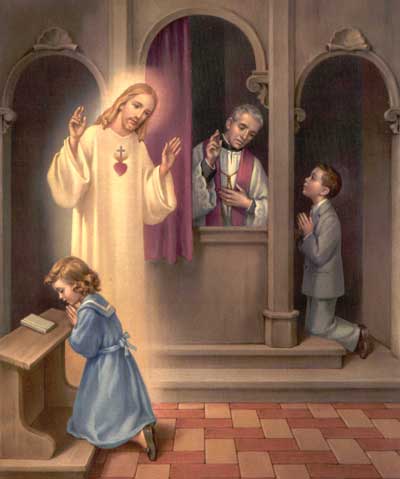Skip to comments.
Why do Catholics have to confess their sins to a priest instead of praying straight to God? [Ecu]
Black Cordelias ^
| July 2, 2008
| bfhu
Posted on 07/03/2008 10:06:26 AM PDT by NYer

Q. Why do Catholics have to confess their sins to a priest instead of praying straight to God?
A. In obedience to Christ.
John 20:19-23 On the evening of that first day of the week, when the disciples were together, with the doors locked for fear of the Jews, Jesus came and stood among them and said, “Peace be with you!” 20After he said this, he showed them his hands and side. The disciples were overjoyed when they saw the Lord. 21 Again Jesus said, “Peace be with you! As the Father has sent me, I am sending you.” 22 And with that he breathed on them and said, “Receive the Holy Spirit. 23 If you forgive anyone his sins, they are forgiven; if you do not forgive them, they are not forgiven.”
After His resurrection, Jesus, appeared to His disciples on Easter Sunday evening. He conferred the power to forgive sins by breathing on them. This corresponds to God breathing life into Adam. And so, Jesus breathes life giving power to forgive sins into his disciples. Note that this is before Pentecost and the general bestowal of the Holy Spirit. This is a special and unique pouring out of the Holy Spirit for the disciples, the first priests and bishops of the Christian Church.
And the purpose of this special dispensation of the Holy Spirit is to empower the apostles with the authority to forgive or not forgive sins in the name of Christ. This specific action cannot mean some sort of general power such as that by the preaching of the Gospel sins are forgiven or not depending upon the hearer. Jesus says, “If you forgive….if you do not forgive…” It would be impossible for the disciples to obey Jesus without audibly hearing the confessions of men and women, boys and girls.
2 Corinthians 5:17-20 Therefore, if anyone is in Christ, he is a new creation; the old has gone, the new has come! 18All this is from God, who reconciled us to himself through Christ and gave us the ministry of reconciliation: 19that God was reconciling the world to himself in Christ, not counting men’s sins against them. And he has committed to us the message of reconciliation. 20We are therefore Christ’s ambassadors, as though God were making his appeal through us. We implore you on Christ’s behalf: Be reconciled to God.
Now this verse can be interpreted in a Protestant way to mean salvation by the preaching of the Gospel. However, we see this verse as further proof for the sacrament of reconciliation/confession. Also, James points out
James 5:13-16 Is any one of you in trouble? He should pray. Is anyone happy? Let him sing songs of praise. 14Is any one of you sick? He should call the elders of the church to pray over him and anoint him with oil in the name of the Lord. 15And the prayer offered in faith will make the sick person well; the Lord will raise him up. If he has sinned, he will be forgiven. 16Therefore confess your sins to each other and pray for each other so that you may be healed. The prayer of a righteous man is powerful and effective.
The Greek word for elders is presbuterous. This is the Greek etymological root from which we get our English word for priest. So, James is saying to call the priests to pray for healing both physical and spiritual. Why would James specify the calling of the elders/priests for those who are sick if they had no more authority than the average Christian?
TOPICS: Apologetics; Catholic; Theology; Worship
KEYWORDS: catholic; confession; penance
Navigation: use the links below to view more comments.
first previous 1-20, 21-40, 41-60, 61-80 ... 141-147 next last
To: Juan Medén
Neither should we read "priest" into presbuteros because priests, as we know them, did not exist in the first century and would have been unrecognizable to the first century writers of the Bible. And the oak looks nothing like the acorn.
41
posted on
07/03/2008 1:06:06 PM PDT
by
Petronski
(Scripture & Tradition must be accepted & honored w/equal sentiments of devotion & reverence. CCC 82)
To: Gumdrop
Are you a priest, NYer? That’s hoe I interpret your message. No but I am a Soldier of Christ!
42
posted on
07/03/2008 1:06:13 PM PDT
by
NYer
("Ignorance of scripture is ignorance of Christ." - St. Jerome)
To: xzins
That is close to Catholic understanding. However, the priest is a human being with authority to absolve or not absolve. If he decides to absolve, he will pray for and with the penitent for God’s forgiveness, and he has an assurance from Christ that it will be given.
A councel cannot do that. On the other hand, a priest may direct the penitent to enter professional counceling, or act himself in that role if he is professionally equipped.
43
posted on
07/03/2008 1:13:19 PM PDT
by
annalex
(http://www.catecheticsonline.com/CatenaAurea.php)
To: NYer; magisterium
"
In John 20:21, before He grants them the authority to forgive sins, Jesus says to the apostles, "as the Father sent me, so I send you." As Christ was sent by the Father to forgive sins, so Christ sends the apostles and their successors forgive sins. In the next line, John 20:22, the Lord "breathes" on the apostles, and then gives them the power to forgive and retain sins. The only other moment in Scripture where God breathes on man is in Gen. 2:7, when the Lord "breathes" divine life into man. When this happens, a significant transformation takes place. Jesus then says in John 20:23 "If you forgive the sins of any, they are forgiven. If you retain the sins of any, they are retained." In order for the apostles to exercise this gift of forgiving sins, the penitents must orally confess their sins to them because the apostles are not mind readers. The text makes this very clear."
So I guess that what you are saying is that since Christ "breathed authority (or power)" to forgive sins onto a group of human beings, He must have intended that penitants confess their sins to those human beings.
And I guess that you would also say that Christ thereby commanded all of His followers not to confess their sins directly to Christ (or to God the Father), but instead to this group of human beings that have the authority to forgive sins.
If I understand you correctly, you are saying that Christ, in John 20:21-23, is saying, "I command you, my followers, never to confess your sins to Me or to my Father who is in Heaven. You must, instead, confess your sins to this group of ordained human beings who have the authority and power to forgive sins -- and only to them. When you pray, never ever confess your sins to me or to my Father. Such prayers are of no value to you, and I will not hear them. Instead, you must confess to a human being."
I'm a little confused by that particular interpretation of John 20: 21-23.
It seems to me that in sort of contradicts Jesus' response to a question posed to him about how to pray. In his response, Jesus, when showing his disciples how to pray, says, "Forgive us our trespasses (or debts) as we forgive those who trespass against us (or our debtors).
Doesn't Jesus commend praying directly to "Our Father", and in that prayer, seeking forgiveness for sins?
44
posted on
07/03/2008 1:18:10 PM PDT
by
chs68
To: chs68
If I understand you correctly...Uh, no.
45
posted on
07/03/2008 1:19:34 PM PDT
by
Petronski
(Scripture & Tradition must be accepted & honored w/equal sentiments of devotion & reverence. CCC 82)
To: Petronski
No, in fact, an acorn does not look anything like an oak. And if I say the squirrel ate an acorn I don’t mean that he ate an oak tree.
To: xzins
I’d probably have no problem if it were made clear that forgiveness comes from God, but the minister is simply there to pray with the person and to point out the need to change one’s life. The priest is there to hear the confession and guide the penitent - yet - but also to administer absolution, "in the name of the Father and of the Son and of the Holy Spirit". There have been several saints who were granted the grace of being able to 'read souls' and even smell sin. Saint Faustina, a Polish nun to whom our Lord appeared, was told to write the following in a diary, on the topic of Confession. (red text is that of our Lord)
| Today the Lord said to me, Daughter, when you go to confession, to this fountain of My mercy, the Blood and Water which came forth from My Heart always flows down upon your soul and ennobles it. Every time you go to confession, immerse yourself in My mercy, with great trust, so that I may pour the bounty of My grace upon your soul. When you approach the confessional, know this, that I Myself am waiting there for you. I am only hidden by the priest, but I myself act in your soul. Here the misery of the soul meets the God of mercy. Tell souls that from this fount of mercy souls draw graces solely with the vessel of trust. If their trust is great, there is no limit to My generosity. The torrents of grace inundate humble souls. The proud remain always in poverty and misery, because My grace turns away from them to humble souls. (1602) |
| |
| My daughter, just as you prepare in My presence, so also you make your confession before Me. The person of the priest is, for Me, only a screen. Never analyse what sort of a priest it is that I am making use of; open your soul in confession as you would to Me, and I will fill it with My light. (1725) |
Confession of sins in the Sacrament of Penance |
The priest is like a screen with Christ as the listener and absolver.

47
posted on
07/03/2008 1:27:19 PM PDT
by
NYer
("Ignorance of scripture is ignorance of Christ." - St. Jerome)
To: NYer
"
The priest is like a screen with Christ as the listener and absolver."
What, again, is the real need for such a screen?
Is it that Jesus is unable to hear a confession from a penitant unless there is some sort of screen between Him and the penitant? Is Jesus too busy to hear a confession?
Or is it that the penitant is unable of knowing -- really knowing -- the he or she is forgiven unless a priest gives him or her such assurance?
48
posted on
07/03/2008 1:41:11 PM PDT
by
chs68
To: Petronski
Please.
Do correct my understanding of what was said.
49
posted on
07/03/2008 1:42:01 PM PDT
by
chs68
To: NYer
50
posted on
07/03/2008 1:46:19 PM PDT
by
Salvation
(†With God all things are possible.†)
To: NYer; annalex
I wouldn’t be comfortable taking it any farther than I’ve already spelled out.
51
posted on
07/03/2008 1:48:36 PM PDT
by
xzins
(Retired Army Chaplain -- Those denying the War was Necessary Do NOT Support the Troops!)
To: chs68
Here are the actual words of the priest in Absolution. You get only one guess as to who forgives a Catholic's sins in the Sacrament of Reconciliation!
Did you guess?
Here's the answer (the highlighting/bolding is mine):
1449 The formula of absolution used in the Latin Church expresses the essential elements of this sacrament: the Father of mercies is the source of all forgiveness. He effects the reconciliation of sinners through the Passover of his Son and the gift of his Spirit, through the prayer and ministry of the Church:
- God, the Father of mercies,
through the death and the resurrection of his Son
has reconciled the world to himself
and sent the Holy Spirit among us
for the forgiveness of sins;
through the ministry of the Church
may God give you pardon and peace,
and I absolve you from your sins in the name of the Father, and of the Son and of the Holy Spirit. |
52
posted on
07/03/2008 1:49:11 PM PDT
by
Salvation
(†With God all things are possible.†)
To: Salvation
Thank you for your post.
But now I am confused.
Earlier, another poster directed me to John 20: 21-23, and said this about that portion of Scripture: "In John 20:21, before He grants them the authority to forgive sins, Jesus says to the apostles, "as the Father sent me, so I send you." As Christ was sent by the Father to forgive sins, so Christ sends the apostles and their successors forgive sins."
You understand my confusion, I trust.
Did Christ grant the apostles and their successors the authority to forgive sins, or didn't He?
53
posted on
07/03/2008 1:57:29 PM PDT
by
chs68
Comment #54 Removed by Moderator
To: chs68
55
posted on
07/03/2008 2:05:47 PM PDT
by
Petronski
(Scripture & Tradition must be accepted & honored w/equal sentiments of devotion & reverence. CCC 82)
To: Hebrewbrother
That is sooo funny - you haven't heard of "indulgances." I remember a poor family in New York Mills MN in 1975 who were promised their crops would fail for sure unless they caughed up $500 to the local priest. Sick. Prove it.
56
posted on
07/03/2008 2:06:52 PM PDT
by
Petronski
(Scripture & Tradition must be accepted & honored w/equal sentiments of devotion & reverence. CCC 82)
To: Lucky9teen
I don’t know, we don’t get to see the heart of the sinner. God knows and if the person is continuing in his sin and ignoring reparation and amendment one would hope that the Holy Spirit would convict him of his sin and allow him to recognize it.
57
posted on
07/03/2008 2:11:35 PM PDT
by
tiki
(True Christians will not deliberately slander or misrepresent others or their beliefs)
To: chs68
Did Christ grant the apostles and their successors the authority to forgive sins, or didn't He?Yes, but to do so by the power of the Holy Spirit, as the prayer says, in the name of the Father, and of the Son and of the Holy Spirit.
Joh 20:22 When he had said this, he breathed on them; and he said to them: Receive ye the Holy Ghost.
58
posted on
07/03/2008 2:11:36 PM PDT
by
Petronski
(Scripture & Tradition must be accepted & honored w/equal sentiments of devotion & reverence. CCC 82)
To: Petronski
Thank you for your link to the portion of the Roman Catholic Catechism concerning the seven sacraments of the Roman Catholic Church.
It does still seem to me as though the Roman Catholic Church is saying that a penitant must never ever confess his or her sins directly to God, and that doing so is completely without effect. In other words, it appear that the Roman Catholic Church is saying that God will not hear prayers of people who want to confess their sins directly to Him, and that God will not forgive any sin that is confessed directly to Him.
"1456 Confession to a priest is an essential part of the sacrament of Penance."
"1461 Since Christ entrusted to his apostles the ministry of reconciliation,65 bishops who are their successors, and priests, the bishops' collaborators, continue to exercise this ministry. Indeed bishops and priests, by virtue of the sacrament of Holy Orders, have the power to forgive all sins "in the name of the Father, and of the Son, and of the Holy Spirit."
Doesn't that mean that God will not hear a confession made directly to Him?
And so wouldn't that also mean that, as I posted in post #44, that the Roman Catholic Church is teaching that "Christ, in John 20:21-23, is saying, "I command you, my followers, never to confess your sins to Me or to my Father who is in Heaven. You must, instead, confess your sins to this group of ordained human beings who have the authority and power to forgive sins -- and only to them. When you pray, never ever confess your sins to me or to my Father. Such prayers are of no value to you, and I will not hear them. Instead, you must confess to a human being."
59
posted on
07/03/2008 2:19:16 PM PDT
by
chs68
To: chs68
Thank you for your link to the portion of the Roman Catholic Catechism...Inaccurate. I gave you a link to a portion of the Catechism of the Catholic Church.
60
posted on
07/03/2008 2:21:17 PM PDT
by
Petronski
(Scripture & Tradition must be accepted & honored w/equal sentiments of devotion & reverence. CCC 82)
Navigation: use the links below to view more comments.
first previous 1-20, 21-40, 41-60, 61-80 ... 141-147 next last
Disclaimer:
Opinions posted on Free Republic are those of the individual
posters and do not necessarily represent the opinion of Free Republic or its
management. All materials posted herein are protected by copyright law and the
exemption for fair use of copyrighted works.
FreeRepublic.com is powered by software copyright 2000-2008 John Robinson


